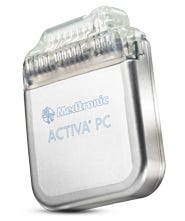July 6, 2016
Improper handling of neuromodulation devices may have caused wire kinking, breaking.
Nancy Crotti
|
Medtronic's Activa PC is one of two neurostimulators using the affected DBS pocket adaptors. (Image courtesy of Medtronic) |
Medtronic has issued a global field safety alert for deep-brain-stimulation pocket adaptors after discovering broken wires in returned models.
A company analysis of 16 DBS pocket adaptors that were returned for high impedance measurements identified "conductor wire fractures in close proximity to the location where the adaptor wire exits the neurostimulator connector block," according to the notice.The company is still investigating the cause of the fractures, and has notified the regulatory bodies of the countries where it sells the devices, according to a spokesperson.
Fourteen of the devices were returned following revision surgery. The other two were identified during surgery, the company said. The field notice advises physicians to read the product labels and manuals on how to handle pocket adaptors and check system integrity during implant procedures.
The affected adaptors, models 64001 and 64002, may be used with the company's Activa PC and Activa RC implantable stimulators. Approximately 20,000 Medtronic DBS pocket adaptors have been sold worldwide since 2009, with a 0.08% reported rate of adaptor wire fracture, the company noted. No recall is planned and no action is required for unused and unopened products, the company said.
One adverse event report filed with FDA said the healthcare provider "reported via the rep that since the move to the Activa PC, there have been all kinds of problems with hardware, with or without adaptor" including "repetitive problems with breakage, especially in relation to the adaptor and cable breakages." Impedance levels in an unspecified number of Parkinson's disease patients were deemed acceptable immediately following implantation, but "over the months contacts start to show high impedances," the report says.
Another adverse event report from October 2015 said the patient had the DBS implanted to control Tourette syndrome and was having more tics following the implant. An analysis of the adaptor revealed that the body conductor was broken within 10 cm of the connector area, and that another conductor was broken 2.8 cm from the proximal end. Another report, from November 2015, indicated "very high impedance" and some broken connectors in a pocket adaptor for a patient with dystonia. The adaptor was replaced, according to the report.
Medtronic issued a field safety notice in April 2015 for two other DBS extension models with similar advice on how to avoid wire fractures. In 2013, the company recalled 1598 devices belonging to its Deep Brain Stimulation Lead Kits and Dystonia HDE Therapy Kits. The products were recalled as a result of potential for damage owing to the use of the lead cap provided in the kits. This lead cap was designed to protect the proximal connector end of the lead while it is surgically implanted.
Nancy Crotti is a contributor to Qmed.
Like what you're reading? Subscribe to our daily e-newsletter.
About the Author(s)
You May Also Like



